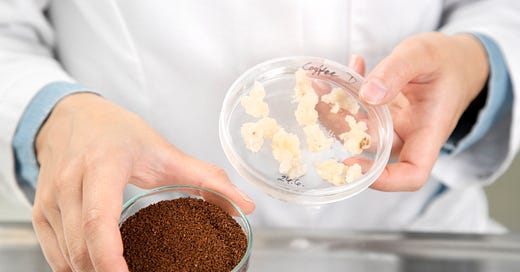Veggie Digest #8
"Meat" made from jackfruit, sustainable coffee, seaweed cow feed, and much more!
Welcome to the latest installment of the Veggie Digest, the newsletter that keeps you on top of the latest in sustainable food innovations.
Headlines and Trends
A curated roundup of interesting food tech news from the past week.
📰 Plant-Based Menu Items Are Infiltrating Fast Food—and Meat-Eaters Are All over Them (Business Insider)
Burger King, Del Taco, McDonald's, and Carl's Jr are just some of the fast-food chains that have been adding more vegans and vegetarian items to their menu. Plant-based meat substitutes have been growing increasingly popular for meat-eating Americans, as they are now motivated to swap animal products for plant-based products for health benefits and environmental reasons.
📰 Sausage Made from Jackfruit (The Spoon)
Jack & Annie’s, a Colorado-based company, makes plant-based meat alternatives such as meatballs and sausages out of jackfruit. The reason for using this uncommon fruit, aside from its neutral flavor, is because an unripe jackfruit has a texture that mimics shredded pork or chicken. It is also affordable, high in protein content, and contains potassium and vitamin B.
📰 Seaweed to Cow Feed: Sweden Is Building the World’s Largest Algae Factory (Euro News)
A Swedish start-up is building the world’s largest algae factory to create emission-reducing seaweed feed for cattle. The factory is powered sustainably by waste energy from local industries used in production. Using red seaweed known as Asparagopsis taxiformis, a team of scientists and climate innovators created a cow supplement, ‘Volta Seafeed.’ When this seaweed feed is fed to cows at a daily dose of 100 grams, it reduces their enteric methane emissions by up to 80%. Feeding a cow 100 grams of the seaweed feed naturally suppresses the methane-producing enzyme and as a result, reduces the methane emissions.
📰 Sustainable Coffee Grown in Finland with Cellular Agriculture (VTT Research)
Due to the high demand for coffee, there is an increased amount of deforestation resulting from coffee bean production. VTT Technical Research Centre of Finland has created coffee cells in a bioreactor using cellular agriculture which will make the production of coffee more sustainable.
📰 Eating Sustainably Is One of the Easiest Ways to Combat Climate Change (ABC News)
The easiest thing an individual can do in their daily lives to make an impact in the climate fight are changes to their diets (reduce meat consumption and increase plant consumption). Experts say people don’t even need to be vegetarian or give up animal products altogether, although meat consumption is the largest culprit of greenhouse gas emissions in American diets.
Food Lingo: “Regenerative Agriculture”
There’s a lot of jargon in the food technology and sustainability space. Each week I highlight an important concept to improve your food lingo literacy.
Regenerative Agriculture describes farming and grazing practices that reverse climate change by restoring soil quality, biodiversity, ecosystems health, water quality while producing sufficient food of high nutritional quality. Resulting in both carbon drawdown and improving the water cycle.
📰 Unilever Is Addressing Deforestation, Living Wages, And Regenerative Agriculture (Food Navigator)
Unilever is one of the world’s largest consumer goods companies and has a large footprint in soy, palm oil, and cocoa, along with other ingredients commonly associated with unethical, unsustainable practices.
Unilever is honing in on regenerative agriculture to mitigate and reverse climate change by putting regenerative agriculture at the forefront of several programs around the world, one being soybean oil.
Most of the soy oil used by Unilever comes from soybeans grown in the U.S and Brazil. They are working with soy farmers and suppliers to increase the use of cover crops that will protect the soil.
Sustainability Beyond Food
A handful of non-food-specific pieces to keep you abreast of other environmental items of interest.
📰 L.A.’s New Reflective Streets Bounce Heat Back into Space (Reasons to Be Cheerful)
The record heat waves that have scorched the earth this year will only get worse, especially in cities where heat radiates off buildings and asphalt. In a neighborhood in Los Angeles, the pavement has been painted with a special reflective coating, which caused the locations and surrounding area to be two degrees Fahrenheit cooler. Reducing greenhouse gas emissions would tackle the root cause of increasing global temperatures, but in the meantime, one way to lower the temperature would be to paint roofs and streets white.
📰 How to Handle Climate Anxiety (Knowable Magazine)
In addition to the visible effects of climate change—extreme heat, drought, and flooding—is a psychological toll. Surveys report that people are feeling helpless, depressed, and guilty about the state of the world. In particular, young people are especially anxious about the future. In addition to tracking this phenomenon, this article also lists out some of the coping strategies and constructive behaviors that individuals can take.
———
Thank you for reading the Veggie Digest newsletter. If you’re enjoying it, be sure to share it with your friends and colleagues.
If this newsletter was forwarded to you, visit this link to subscribe.
You can reach me by replying directly to this email or by adding a comment on Substack.


